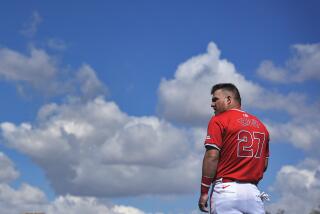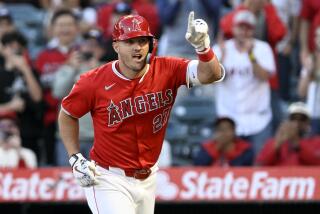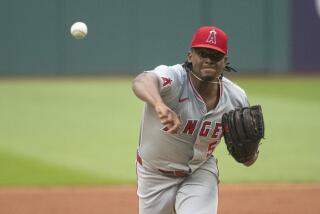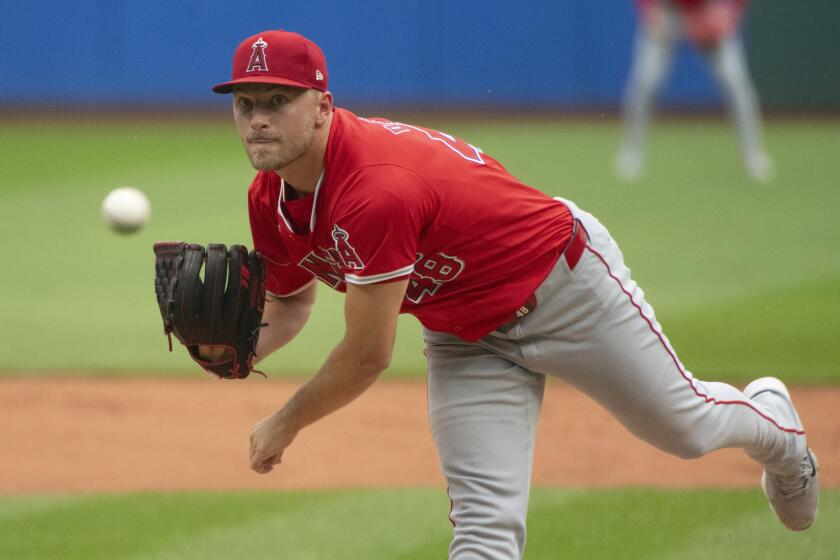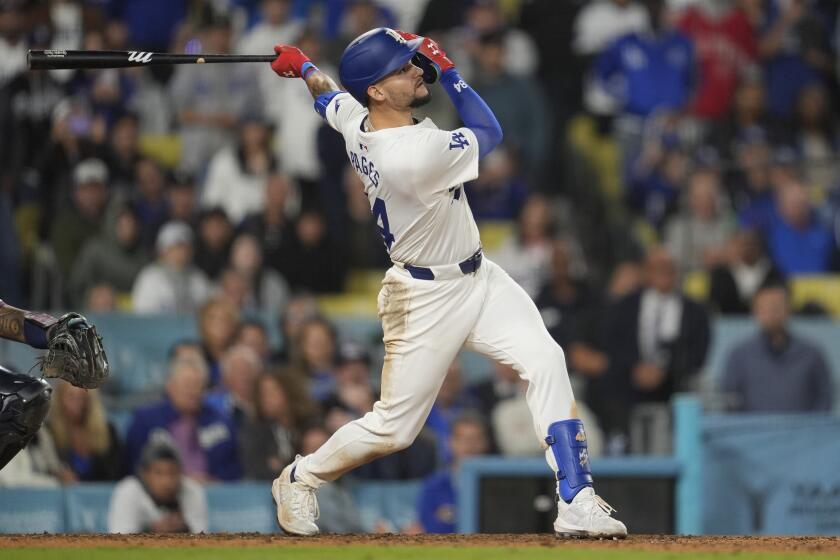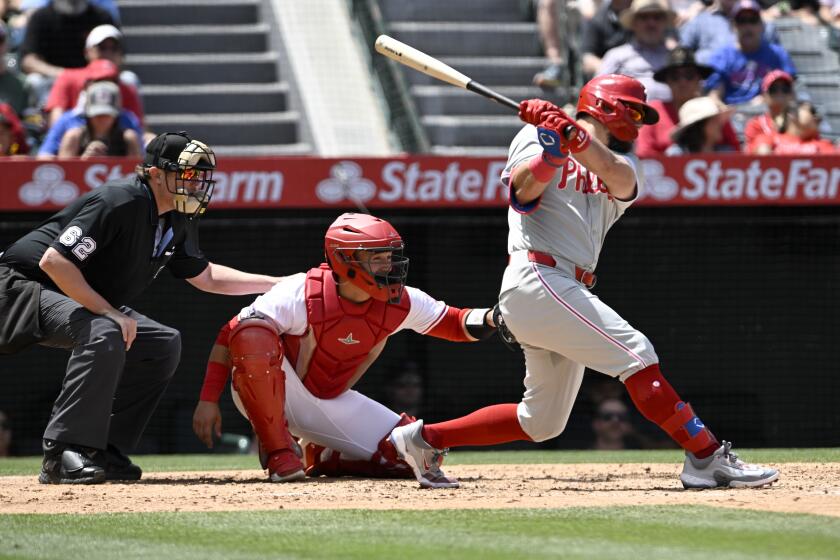A DASH OF CHILI : Often the Center of Controversy in San Francisco, Davis Is Finally Free of the Hated Candlestick Park; Now, He’s Looking to Stir Up Excitement as a Right Fielder With the Angels
Chili was his name and chilly was his outlook, which, he now says, was only one man’s reaction to his environment.
Charles Theodore Davis, born in Kingston, Jamaica, and raised in Los Angeles, grew up firmly believing that baseball was a warm-weather sport. Played in daylight, the sun should burn and the ball should carry. Played at night, maybe there would be a soft summer breeze.
That line of thinking, of course, was absurdly naive, as Davis discovered as soon as he became a San Francisco Giant. Welcome, Chili, to Candlestick Park, home of baseball’s first artificial tundra. A good place to hang meat, if not necessarily pennants. The only park in America where the whipping winds can turn a pull hitter into a spray hitter by the fifth inning.
“You’d get to Candlestick at 5 o’clock and the wind would be blowing in your eyes,” Davis says. “You’re freezing. You’re trying to take batting practice with big old jackets on.
“And this was in mid-July.”
Chili was nimble, and Chili was quick, but Chili never got used to Candlestick. He spent six seasons there, and grew to hate everything about it.
He hated how the bat stung in his hands whenever he made less than perfect contact with a pitch.
He hated how the ball died on the warning track, just as he was starting his home run trot.
He hated how the fans stayed away by the thousands, leaving an already cold stadium empty and gray.
And he hated the criticism he received--both from the fans and the media--whenever he mounted the soapbox to speak his mind on such matters.
By the end of last season, Davis, in his mind, was a man without a team--or at least without a future in San Francisco. He hit 24 home runs and drove in 76 runs to help the Giants win their first divisional title since 1971, but the relationship was beyond repair. Knowing how badly Davis wanted out of Candlestick, and not ready to move the franchise, the Giants made no attempt to re-enlist him when his contract expired in October.
On Dec. 1, the same day Davis signed as a free agent with the Angels, San Francisco signed free-agent outfielder Brett Butler. The split everyone saw coming was finally complete. And when it was done, as Davis put it, it was best for everyone involved.
“I had nothing against the Giants,” Davis said. “I think Bob Lurie is a good owner and I wish my ex-teammates a lot of luck. I’d like to see them again in the World Series.
“But I’m not a cold-weather person. And Candlestick is the windiest, coldest place to play, day in and day out. It isn’t a good baseball environment.
“After a while, it got to be too much for me.”
Other Giants before Davis have felt that way--Jack Clark comes to mind--but few have gone to the extremes Davis did in making his break.
To escape Candlestick, Davis chose to abandon a team that finished a game shy of the World Series, a team many believe to be still on the rise, and hitched up with a club that tied for last place in the American League West.
It took the Angels one full year to go from first place to last. Davis made the same move in a matter of days.
“But before that team was a first-place team, it was a last-place team,” Davis said of the 1987 Giants. “And the Angels have a history of following good seasons with bad ones. They make the playoffs one year, they’re down the next, and then they come back again.
“I think I caught them on a good year.”
And only one year, according to the terms of Davis’ contract. That was the extent of the Angels’ offer--one year at a base salary of $850,000.
Davis, who made $815,000 in 1987, snatched it up, nonetheless.
A man must be driven by a special force to take such measures at the age of 28, the supposed prime of his athletic career. Candlestick Park can’t be all that bad, can it?
Oh yes it can, Davis insists. And if you’ve got the time, he’s got the reasons.
THE COLD
Angel relief pitcher DeWayne Buice is an old minor league buddy of Davis’, dating to when Davis was his catcher at Cedar Rapids, Iowa, and Fresno in the lower levels of the Giants’ farm system. The two have kept in touch over the years, but once Davis was promoted to the big club in 1981, Buice quickly learned that “How’s the weather?” was not the best way to open a conversation.
“From day one, Chili was always complaining about the cold, cold weather,” Buice remembers. “He said it was so hard to stay loose in the outfield. He’d put on the long underwear, tights, five pounds of clothes just to go out there.
“Being a Southern California boy, I don’t think I’d enjoy it, either--going out there daily in 45-degree weather at 2 o’clock in the afternoon.”
Said Davis: “It was a bad place to build a stadium in the first place. The weather there is weird. I lived in Belmont, which is about a 20-minute drive away, and there’d be at least a 20-degree difference from the time I left my house and when I got to the park.
“I’d leave Belmont in shorts--and when I’d get to Candlestick, I’d have to throw on a jacket.”
More weirdness, according to Davis: At Candlestick, the temperatures are lower in the summer than they are in the fall.
“The weather gets better later on in the year,” he said. “The weather actually starts to get nice in September and October. The (San Francisco) 49ers have better weather than we had.”
The Candlestick climate became unbearable last season, after he returned from off-season surgery to repair a dislocated shoulder, Davis said.
“I’ve got a screw in my shoulder,” he said. “Playing with that, in that cold weather, was like trying to play in Alaska. I couldn’t get any range of motion. It was impossible.”
THE WIND
The fickle gusts that blow over Candlestick off the bay--and keep certain home run balls in play--didn’t bother Davis at first. But only at first.
“When you’re a rookie and they first call you, you’ll go anywhere,” he said. “Hell, you’ll go to Cleveland and be happy.
“But you go up there after spending the spring in Arizona. If you come out of spring training smokin’, that wind will cool your butt down real quick. After a while, it starts to get to you.
“I’d look around at guys on other teams, guys on the same level as me, and they’re putting up pretty good numbers. They’d all have seven, eight, nine more (home runs) than I’d have. Everything else would be the same, but because I’m playing at Candlestick, this guy would be a so-called better player than me.”
The Giants called balls that reached the warning track “Doody belts,” as in Howdy Doody, the nickname given Darrell Evans while he played in San Francisco. Those deep fly balls were made famous by Evans--home runs in any other park in the country, but merely long outfield outs in Candlestick.
Davis came to know the feeling.
“I crushed some balls last year that woulda, coulda . . . “ Davis said. “I could’ve easily hit 30 (home runs).
“There must have been seven or eight balls I hit at Candlestick where I’m trotting to first, I look up and that s.o.b. is getting caught on the track.
“That wasn’t my best year last year. And each time you hit one of those and it ends up a long out, it depresses you even more.”
THE FANS
Whenever Davis talks about the crowds at Candlestick, Angel reliever Greg Minton listens.
And seconds the argument.
Minton spent a decade in the Giants’ organization--and established a club record for saves in the process. But when his sinker stopped sinking around 1985, Minton became prey for the Candlestick wolves and was all but hooted out of town late last May.
“San Francisco, Philadelphia and New York--those three places can turn on you in a heartbeat,” Minton says. “They say the quintessential athlete is the one who can do his job, make his money and tune out the fans, but I’m sorry. When you start hearing things about what your mother and the milkman supposedly did the night before, that’s impossible to tune out.”
Davis calls the Candlestick fans “loud and obnoxious . . . they’re like East Coast fans. They hated anybody that came to play their team and they were hard a lot of times on their own players, too.”
Most of the time, Davis could deal with such behavior. “To me, loud and obnoxious is normal,” he said.
Davis found it more difficult to deal with indifference.
Late in the 1986 season, with the Giants in contention but drawing only scant attention at home, Davis uncorked the now infamous line that became his San Francisco epitaph.
“We have about 6,000 real fans who root for us,” Davis said. “The rest of them aren’t real fans. They’re . . . who come out to watch the other team beat us. As far as I’m concerned, they should pack up this team and get the hell out of this place and see how people like not having baseball here.”
Davis was immediately christened a San Francisco anti-hero, but Minton claims that “everybody on the team knew he was right. He was the one who had the guts to say it.”
At the same time, however, Minton viewed the incident as a portent of things to come.
“That was the first sign we had that Chili was starting to lose it,” he said.
AND OTHER THINGS
Davis interrupted his discourse on the evils of Candlestick Park, wanting to make a point.
“The stadium itself wasn’t the only reason I came over here (to the Angels) to play,” he said. “There also comes a time in your life, in your career, when it’s time to make a change. Sometimes, things happen to open your eyes.”
For Davis, the eye-opener was Giant Manager Roger Craig’s shuttle system in the outfield. Davis, Jeff Leonard, Candy Maldonado, Mike Aldrete, Eddie Milner, Joel Youngblood--Craig ran them in and out of the lineup like messenger guards in football.
“I platooned a lot last year and I didn’t like it,” Davis said. “Maybe when you’re older in age and you see some young player coming up, it might be OK. But I’m not at that point yet. I’m 28 years old.
“Last year gave me a taste of what possibly could happen there again this year. I don’t plan on being platooned ever that way again.”
Said Minton: “I don’t think Chili really fit into Roger Craig’s plans. Chili’s a strong hitter, a power hitter, but he doesn’t have blazing speed. Roger Craig wants all his outfielders to run the 100 in 6.0 (seconds).
“Because Chili’s such a good outfielder, it’s hard not to play him. But he was kind of like a sore thumb sticking out there. He just wasn’t built to their style.”
So, now, Chili Davis has brought his style to the Angels. And he has arrived in his first Angel camp with certain expectations.
He knows that he is now with a team that wants him--no, needs him--in the starting lineup everyday.
He knows that the sun shines all summer long in Anaheim.
He knows that he’ll be playing in front of occupied seats. Win or lose, there will be about 2.6 million out at Anaheim Stadium this season. Friendly people, too.
And, Davis knows that the Angels will play a few games this year at Fenway Park, Tiger Stadium, Yankee Stadium and the Metrodome. No Doody Belts at those parks.
“Chili’s semi-foaming at the mouth already,” Minton said.
The Angels, too, have their expectations.
“Chili hit 24 home runs in Candlestick, a place that doesn’t yield all that many home runs,” Buice said. “In our little bandbox, he may hit 30 or 35, who knows?”
Minton said: “Chili doesn’t need to hear this, but I’ll be sorely disappointed if he doesn’t hit at least 30 home runs here. It’s the Darrell Evans factor; as soon as he leaves Candlestick and gets to Detroit-- boing! --40 homers. Same thing should happen with Chili. And, he’ll hit .280, just by being liked.”
Angel Manager Gene Mauch already likes Davis, which is not particularly surprising. On his back, Davis wears No. 24, the number worn by the man he’ll be replacing in outfield, Gary Pettis.
“I like the way the ball sounds coming off his (Davis’) bat,” Mauch said. “It has a big-league ring to it.”
To Mauch, it sure beats the sounds of silence that Pettis’ bat produced last season. If Davis hits .209 with 2 home runs and 18 RBIs, he will have done more for the Angels than Pettis did in 1987.
“I think Gary will do better in Detroit,” Mauch said. “I wish him well. But I know this much: If Chili Davis was given the number of at-bats in an Angel uniform that were given to Gary Pettis, we’d have had another 60, 70, 80 runs on the board last year.”
Davis believes he can help give the Angels something else.
“I hadn’t told any of these guys yet,” Davis said, gesturing toward a crowded Angel clubhouse, “but everybody who leaves the Giants goes on to make the playoffs somewhere else. Take a look--Darrell Evans in Detroit, (Dan) Gladden in Minnesota, Jack Clark.
“I hope that trend continues.”
More to Read
Go beyond the scoreboard
Get the latest on L.A.'s teams in the daily Sports Report newsletter.
You may occasionally receive promotional content from the Los Angeles Times.
